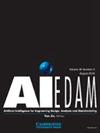打破数据驱动设计:扩大和扩大临床环境
IF 2.3
3区 工程技术
Q3 COMPUTER SCIENCE, ARTIFICIAL INTELLIGENCE
Ai Edam-Artificial Intelligence for Engineering Design Analysis and Manufacturing
Pub Date : 2022-05-19
DOI:10.1017/S0890060421000433
引用次数: 9
摘要
数据支持设计(Data-enabled design, DED)是一种很有前途的新方法,用于在用户自己的环境中以迭代和动手的方式与用户一起设计。然而,该方法的敏捷性和灵活性并不能直接转换到每个上下文中。在本文中,我们反思了一个名为ORBIT的智能生态系统的设计过程,并提出了一个与之相关的评估研究计划。这是与一家医院合作的DED项目的一部分,该项目旨在研究肥胖患者(远程)手术后行为。该项目的设计和准备以及最终被医学伦理委员会(METC)拒绝的研究过程提供了丰富的见解:(1)在临床环境中进行DED研究意味着什么;(2)该方法在该特定应用领域的边界可能在哪里。我们强调从精心设计研究的实质性基础设施中获得的见解,以及如何将DED的不同方面不易转化为临床环境。我们通过对DED所做的几项修改来分析拟议的研究设置,并进一步思考如何扩展和扩大方法,并使该过程适应临床环境。本文章由计算机程序翻译,如有差异,请以英文原文为准。
Breaking up data-enabled design: expanding and scaling up for the clinical context
Abstract Data-enabled design (DED) is a promising new methodology for designing with users from within their own context in an iterative and hands-on fashion. However, the agile and flexible qualities of the methodology do not directly translate to every context. In this article, we reflect on the design process of an intelligent ecosystem, called ORBIT, and a proposed evaluative study planned with it. This was part of a DED project in collaboration with a medical hospital to study the post-operative behavior in the (remote) context of bariatric patients. The design and preparation of this project and the process towards an eventual study rejection from the medical ethical committee (METC) provide rich insights into (1) what it means to conduct DED research in a clinical context, and (2) where the boundaries of the method might lie in this specific application area. We highlight insights from carefully designing the substantial infrastructure for the study, and how different aspects of DED translated less easily to the clinical context. We analyze the proposed study setup through the lenses of several modifications we made to DED and further reflect on how to expand and scale up the methodology and adapt the process for the clinical context.
求助全文
通过发布文献求助,成功后即可免费获取论文全文。
去求助
来源期刊
CiteScore
4.40
自引率
14.30%
发文量
27
审稿时长
>12 weeks
期刊介绍:
The journal publishes original articles about significant AI theory and applications based on the most up-to-date research in all branches and phases of engineering. Suitable topics include: analysis and evaluation; selection; configuration and design; manufacturing and assembly; and concurrent engineering. Specifically, the journal is interested in the use of AI in planning, design, analysis, simulation, qualitative reasoning, spatial reasoning and graphics, manufacturing, assembly, process planning, scheduling, numerical analysis, optimization, distributed systems, multi-agent applications, cooperation, cognitive modeling, learning and creativity. AI EDAM is also interested in original, major applications of state-of-the-art knowledge-based techniques to important engineering problems.

 求助内容:
求助内容: 应助结果提醒方式:
应助结果提醒方式:


